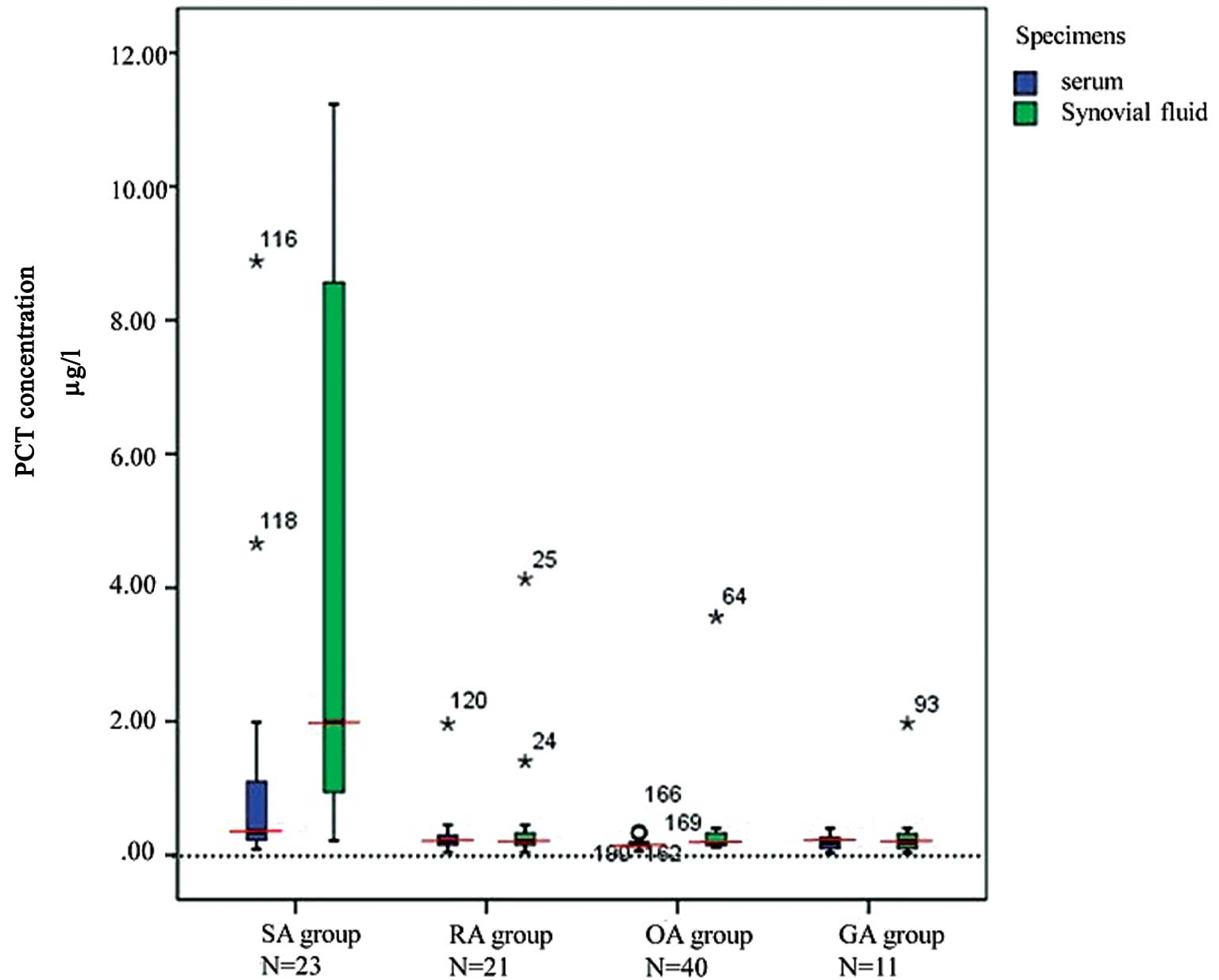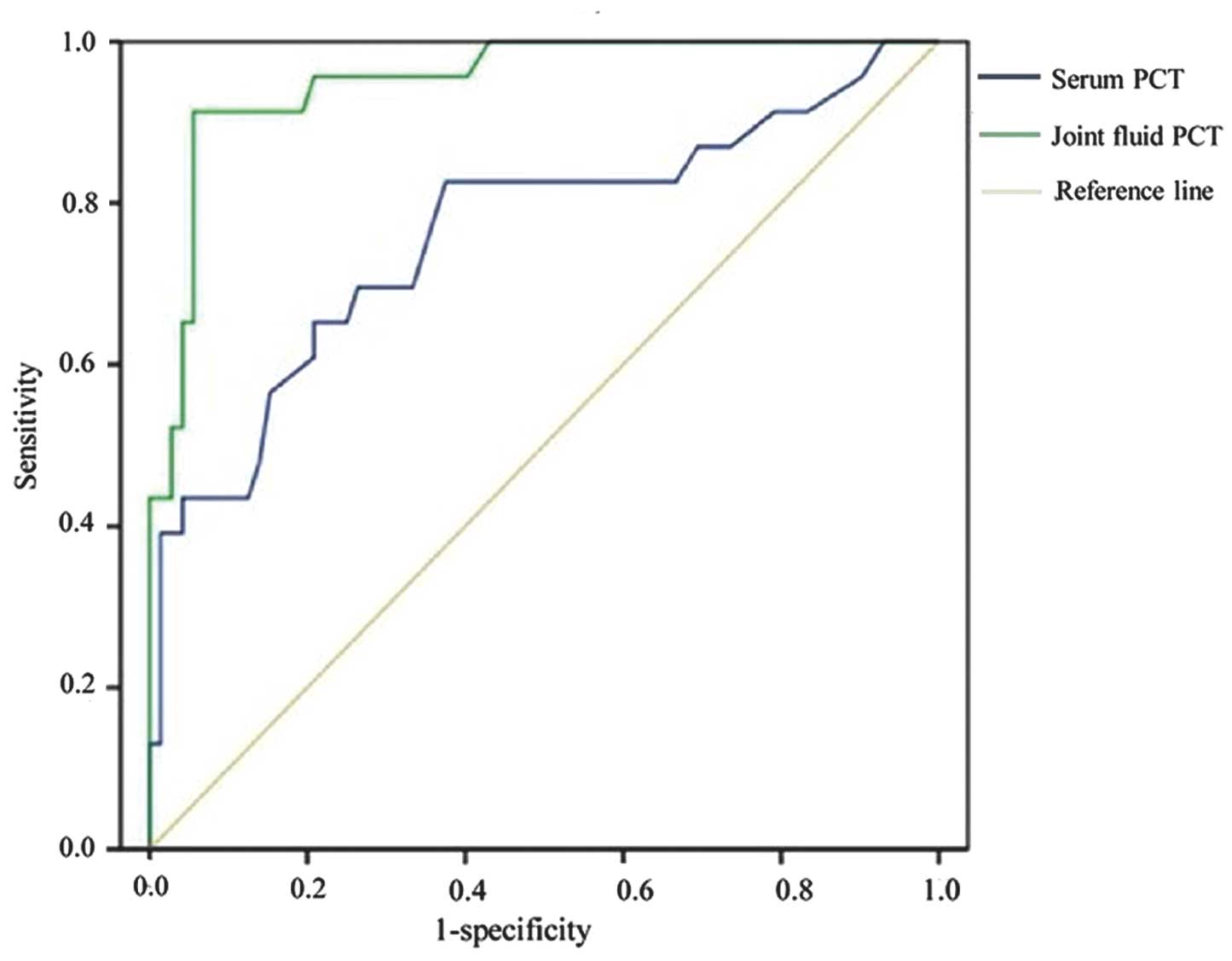|
1
|
Favero M, Schiavon F, Riato L, Carraro V
and Punzi L: Septic arthritis: a 12 years retrospective study in a
rheumatological university clinic. Reumatismo. 60:260–267. 2008.(In
Italian).
|
|
2
|
Ma L, Cranney A and Holroyd-Leduc JM:
Acute monoarthritis: what is the cause of my patient’s painful
swollen joint? CMAJ. 180:59–65. 2009.PubMed/NCBI
|
|
3
|
Margaretten ME, Kohlwes J, Moore D and
Bent S: Does this adult patient have septic arthritis? JAMA.
297:1478–1488. 2007. View Article : Google Scholar : PubMed/NCBI
|
|
4
|
Mathews CJ, Kingsley G, Field M, et al:
Management of septic arthritis: a systematic review. Postgrad Med
J. 84:265–270. 2008. View Article : Google Scholar : PubMed/NCBI
|
|
5
|
Schiavon F, Favero M, Carraro V and Riato
L: Septic arthritis: what is the role for the rheumatologist?
Reumatismo. 60:1–5. 2008.(In Italian).
|
|
6
|
Buess T and Ludwig C: Diagnostic value of
C-reactive protein in comparison with erythrocyte sedimentation as
routine admission diagnostic test. Schweiz Med Wochenschr.
125:120–124. 1995.(In German).
|
|
7
|
McGillicuddy DC, Shah KH, Friedberg RP,
Nathanson LA and Edlow JA: How sensitive is the synovial fluid
white blood cell count in diagnosing septic arthritis? Am J Emerg
Med. 25:749–752. 2007. View Article : Google Scholar : PubMed/NCBI
|
|
8
|
Saeed K, Ahmad N, Pallett A, Guiver M and
Marsh P: Specific staphylococcal polymerase chain reaction can be a
complementary tool for identifying causative organisms and guiding
antibiotic management in orthopaedic infections. Curr Ortho Pract.
21:628–631. 2010. View Article : Google Scholar
|
|
9
|
Yang S, Ramachandran P, Hardick A, et al:
Rapid PCR-based diagnosis of septic arthritis by early Gram-type
classification and pathogen identification. J Clin Microbiol.
46:1386–1390. 2008. View Article : Google Scholar : PubMed/NCBI
|
|
10
|
Caird MS, Flynn JM, Leung YL, Millman JE,
D’Italia JG and Dormans JP: Factors distinguishing septic arthritis
from transient synovitis of the hip in children. A prospective
study. J Bone Joint Surg Am. 88:1251–1257. 2006. View Article : Google Scholar : PubMed/NCBI
|
|
11
|
Khachatourians AG, Patzakis MJ, Roidis N
and Holtom PD: Laboratory monitoring in pediatric acute
osteomyelitis and septic arthritis. Clin Orthop Relat Res. 186–194.
2003. View Article : Google Scholar : PubMed/NCBI
|
|
12
|
Lorrot M, Fitoussi F, Faye A, et al:
Laboratory studies in pediatric bone and joint infections. Arch
Pediatr. 14(Suppl 2): S86–S90. 2007.(In French).
|
|
13
|
Gupta MN, Sturrock RD and Field M: A
prospective 2-year study of 75 patients with adult-onset septic
arthritis. Rheumatology (Oxford). 40:24–30. 2001.PubMed/NCBI
|
|
14
|
Levine MJ, McGuire KJ, McGowan KL and
Flynn JM: Assessment of the test characteristics of C-reactive
protein for septic arthritis in children. J Pediatr Orthop.
23:373–377. 2003. View Article : Google Scholar : PubMed/NCBI
|
|
15
|
Monneret G, Labaune JM, Isaac C, Bienvenu
F, Putet G and Bienvenu J: Procalcitonin and C-reactive protein
levels in neonatal infections. Acta Paediatr. 86:209–212. 1997.
View Article : Google Scholar : PubMed/NCBI
|
|
16
|
Altunhan H, Annagür A, Örs R and
Mehmetoğlu I: Procalcitonin measurement at 24 hours of age may be
helpful in the prompt diagnosis of early-onset neonatal sepsis. Int
J Infect Dis. 15:e854–e858. 2011. View Article : Google Scholar : PubMed/NCBI
|
|
17
|
Reith HB, Mittelkötter U, Debus ES,
Küssner C and Thiede A: Procalcitonin in early detection of
postoperative complications. Dig Surg. 15:260–265. 1998. View Article : Google Scholar : PubMed/NCBI
|
|
18
|
Caliskan B, Guven A, Ozler M, et al: Ozone
therapy prevents renal inflammation and fibrosis in a rat model of
acute pyelonephritis. Scand J Clin Lab Invest. 71:473–480. 2011.
View Article : Google Scholar : PubMed/NCBI
|
|
19
|
Wacker C, Prkno A, Brunkhorst FM and
Schlattmann P: Procalcitonin as a diagnostic marker for sepsis: a
systematic review and meta-analysis. Lancet Infect Dis. 13:426–435.
2013. View Article : Google Scholar : PubMed/NCBI
|
|
20
|
Bohuon C: Inflammatory cascade response to
toxin release: therapeutic perspectives. Ann Pharm Fr. 59:191–197.
2001.(In French).
|
|
21
|
Balog A, Ocsovszki I and Mándi Y: Flow
cytometric analysis of procalcitonin expression in human monocytes
and granulocytes. Immunol Lett. 84:199–203. 2002. View Article : Google Scholar : PubMed/NCBI
|
|
22
|
Das RR: Should procalcitonin be used as a
routine biomarker of bacterial infection? Infection. 40:713–714.
2012. View Article : Google Scholar : PubMed/NCBI
|
|
23
|
Giamarellos-Bourboulis EJ, Mega A, Grecka
P, et al: Procalcitonin: a marker to clearly differentiate systemic
inflammatory response syndrome and sepsis in the critically ill
patient? Intensive Care Med. 28:1351–1356. 2002. View Article : Google Scholar
|
|
24
|
Chalupa P, Beran O, Herwald H, Kaspříková
N and Holub M: Evaluation of potential biomarkers for the
discrimination of bacterial and viral infections. Infection.
39:411–417. 2011. View Article : Google Scholar : PubMed/NCBI
|
|
25
|
Lipinska-Gediga M, Mierzchala M and Durek
G: Pro-atrial natriuretic peptide (pro-ANP) level in patients with
severe sepsis and septic shock: prognostic and diagnostic
significance. Infection. 40:303–309. 2012. View Article : Google Scholar
|
|
26
|
Stankovic Stojanovic K, Steichen O,
Lionnet F, et al: Is procalcitonin a marker of invasive bacterial
infection in acute sickle-cell vaso-occlusive crisis? Infection.
39:41–45. 2011.PubMed/NCBI
|
|
27
|
Saeed K, Dryden M, Bourne S, Paget C and
Proud A: Reduction in antibiotic use through procalcitonin testing
in patients in the medical admission unit or intensive care unit
with suspicion of infection. J Hosp Infect. 78:289–292. 2011.
View Article : Google Scholar : PubMed/NCBI
|
|
28
|
Christ-Crain M and Müller B: Procalcitonin
in bacterial infections - hype, hope, more or less? Swiss Med Wkly.
135:451–460. 2005.PubMed/NCBI
|
|
29
|
Simon L, Gauvin F, Amre DK, Saint-Louis P
and Lacroix J: Serum procalcitonin and C-reactive protein levels as
markers of bacterial infection: a systematic review and
meta-analysis. Clin Infect Dis. 39:206–217. 2004. View Article : Google Scholar : PubMed/NCBI
|
|
30
|
Assicot M, Gendrel D, Carsin H, Raymond J,
Guilbaud J and Bohuon C: High serum procalcitonin concentrations in
patients with sepsis and infection. Lancet. 341:515–518. 1993.
View Article : Google Scholar : PubMed/NCBI
|
|
31
|
Martinez JM, Wagner KE, Snider RH, et al:
Late immunoneutralization of procalcitonin arrests the progression
of lethal porcine sepsis. Surg Infect (Larchmt). 2:193–202. 2001.
View Article : Google Scholar : PubMed/NCBI
|
|
32
|
Sener G, Ozgur E, Rad AY, Uzun L, Say R
and Denizli A: Rapid real-time detection of procalcitonin using a
microcontact imprinted surface plasmon resonance biosensor.
Analyst. 138:6422–6428. 2013. View Article : Google Scholar : PubMed/NCBI
|
|
33
|
van Vugt SF, Broekhuizen BD, Lammens C, et
al: GRACE consortium: Use of serum C reactive protein and
procalcitonin concentrations in addition to symptoms and signs to
predict pneumonia in patients presenting to primary care with acute
cough: diagnostic study. BMJ. 346:f24502013.
|
|
34
|
Talebi-Taher M, Shirani F, Nikanjam N and
Shekarabi M: Septic versus inflammatory arthritis: discriminating
the ability of serum inflammatory markers. Rheumatol Int.
33:319–324. 2013. View Article : Google Scholar : PubMed/NCBI
|
|
35
|
Saeed K, Dryden M, Sitjar A and White G:
Measuring synovial fluid procalcitonin levels in distinguishing
cases of septic arthritis, including prosthetic joints, from other
causes of arthritis and aseptic loosening. Infection. 41:845–849.
2013. View Article : Google Scholar
|
|
36
|
Streit G, Alber D, Toubin MM, Toussirot E
and Wendling D: Procalcitonin, C-reactive protein, and
complement-3a assays in synovial fluid for diagnosing septic
arthritis: preliminary results. Joint Bone Spine. 75:238–239. 2008.
View Article : Google Scholar : PubMed/NCBI
|
|
37
|
Martinot M, Sordet C, Soubrier M, et al:
Diagnostic value of serum and synovial procalcitonin in acute
arthritis: a prospective study of 42 patients. Clin Exp Rheumatol.
23:303–310. 2005.PubMed/NCBI
|
|
38
|
Bottner F, Wegner A, Winkelmann W, Becker
K, Erren M and Götze C: Interleukin-6, procalcitonin and TNF-alpha:
markers of peri-prosthetic infection following total joint
replacement. J Bone Joint Surg Br. 89:94–99. 2007. View Article : Google Scholar : PubMed/NCBI
|
|
39
|
Randau T, Wimmer M, Kuberra D, et al:
Detection of periprosthetic joint infections: blood infection
markers in patients undergoing revision arthroplasty. Eur Cells
Mater. 21:362011.
|
|
40
|
Worthington T, Dunlop D, Casey A, Lambert
R, Luscombe J and Elliott T: Serum procalcitonin, interleukin-6,
soluble intercellular adhesin molecule-1 and IgG to short-chain
exocellular lipoteichoic acid as predictors of infection in total
joint prosthesis revision. Br J Biomed Sci. 67:71–76. 2010.
|
|
41
|
Butbul-Aviel Y, Koren A, Halevy R and
Sakran W: Procalcitonin as a diagnostic aid in osteomyelitis and
septic arthritis. Pediatr Emerg Care. 21:828–832. 2005. View Article : Google Scholar : PubMed/NCBI
|
|
42
|
Hügle T, Schuetz P, Mueller B, et al:
Serum procalcitonin for discrimination between septic and
non-septic arthritis. Clin Exp Rheumatol. 26:453–456.
2008.PubMed/NCBI
|
















